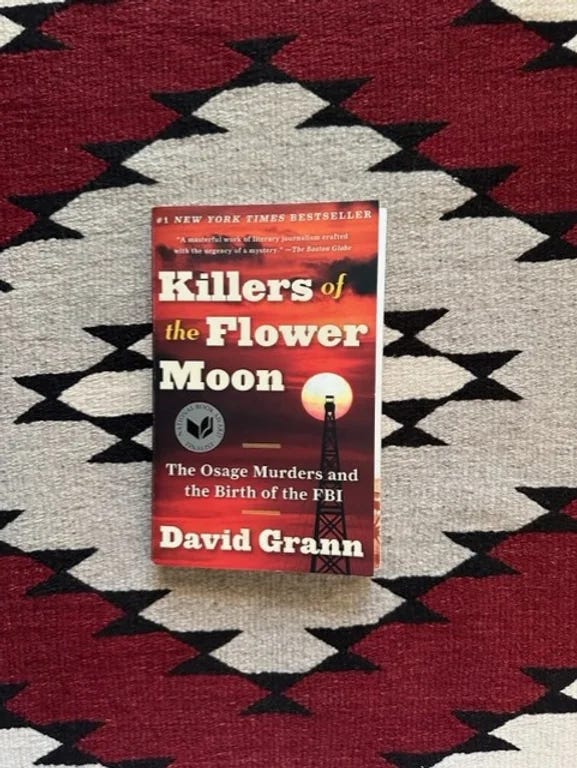Review of KILLERS of the FLOWER MOON
read it before the movie comes out ...
I remember reading the front-page NYT’s book review on this book. I remember many people telling me it is a must read. Six years later I finally read it after a friend handed me a copy in disbelief that I had not read it. It helped that the Martin Scorsese adaptation coming out this fall has received off the chart reviews.
I read it in five days. It is a brilliant combination of original research, crisp prose, and a gift for the dramatic storyline. If I was still teaching US History, it would be my summer reading book. It covers much of the American story. Excuse me if I list:
· Violence … guns & more guns
· Native American genocide
· Violence … poisoning (who knew it was so popular)
· Oil & Greed
· Violence … against women & children & the elderly
· Corruption
· Violence … byword for Texas & environs (sorry … but true)
· The Birth of the FBI … the last resort
Killers of the Flower Moon must be read to be appreciated. All of it unfolds so economically with a final twist as profound as any I have read in this historical crime genre. Better than any podcast or article or book I have read or listened to recently, it answers in an indirect historical context the question: what is wrong with this country?
You might ask what was wrong with me? What took me so long to read such a compelling book? It may have been rooted in (surprise … surprise) pride. Only two years out of the classroom, my sense of loss and the separation that came with that change in life pushed much aside including any further instruction in our history. Thank God that seems to have left me. In hindsight, I always wanted to understand further the oil / Oklahoma / Native American saga in greater depth. Having had their lives reduced to desiccated strips of land in that as yet empty territory, what happened to the Native Americans when the oil was discovered? Though not addressing the question as a whole, the still emerging story of the Osage makes it clear what happened. More importantly, it reinforces the urgency of the on-going revision of our mythic West - a blood-soaked landscape filled with unacknowledged horrors. In telling this Western story so clearly, Gann brings up both the great weakness and strength of history. The former rests in telling a story that becomes the narrative despite the truth being markedly different. In fact, that particular narrative was very likely constructed to deny or bury those truths. The latter, however, is this book’s and history’s ability to rewrite itself. To criticize revisionist history is to criticize history itself. Herodotus contains within it a multitude of revisions of the then accepted oral narratives. Just as it functioned 2500 years ago, revision is the antidote to myths and dogma and all the ignorance that comes with it. Maybe part of why I steered clear of this book six years ago was my own reluctance to once again embrace the disturbing and humbling power of honest and thoughtful revision.
Part of my "pass" may have had to do with the title. It is misleading. The FBI was, in fact, born to some extent after the failure of every layer of law enforcement to look into the murders. While FBI storyline, particularly that of its central agent, is compelling and relevant, I could not help but wonder if it was an editor's lure to deflect the anxiety of facing yet another dark Western truth - one that not only dwarfs the "birth" of the FBI but swallows it. Title confusion is a weak excuse, I acknowledge. How many books like this I have dismissed for all the wrong reasons.?
That might be a good list, one I might need some help compiling.
Killers of the Flower Moon
The Osage Murders and the Birth of the FBI
David Grann
2018 416 pages



There is a central truth here... imo. When you create a new organization with a specific purpose (here the FBI) you may get some of what you wanted. But you will also spawn other things that, even if they don't dilute the desired effect of itself, will produce unwanted side effects. I will mention only Hoover's focus on Martin Luther KIng Jr. Enough said.
The book is thrilling, well written, horrifying and true. What else does one need?